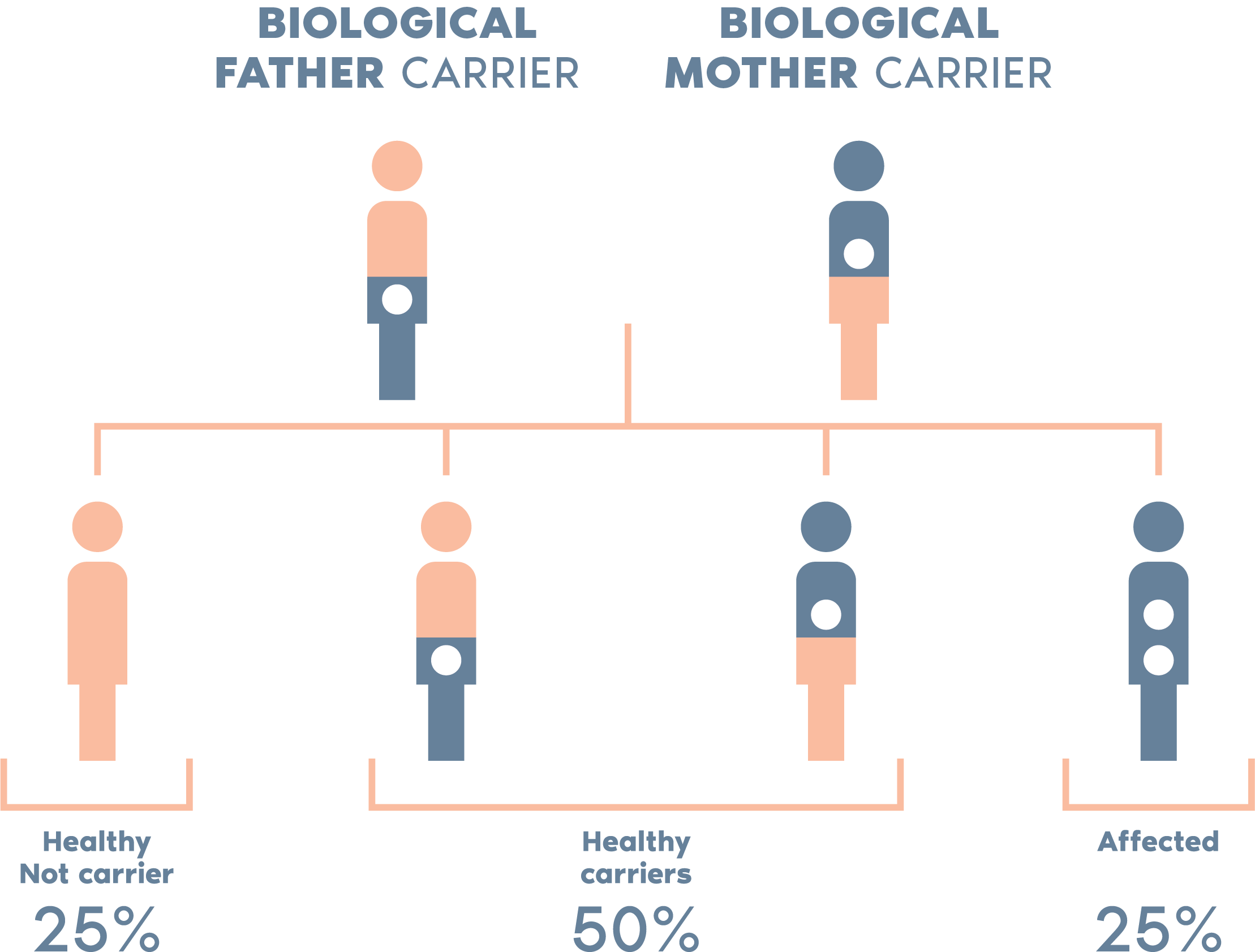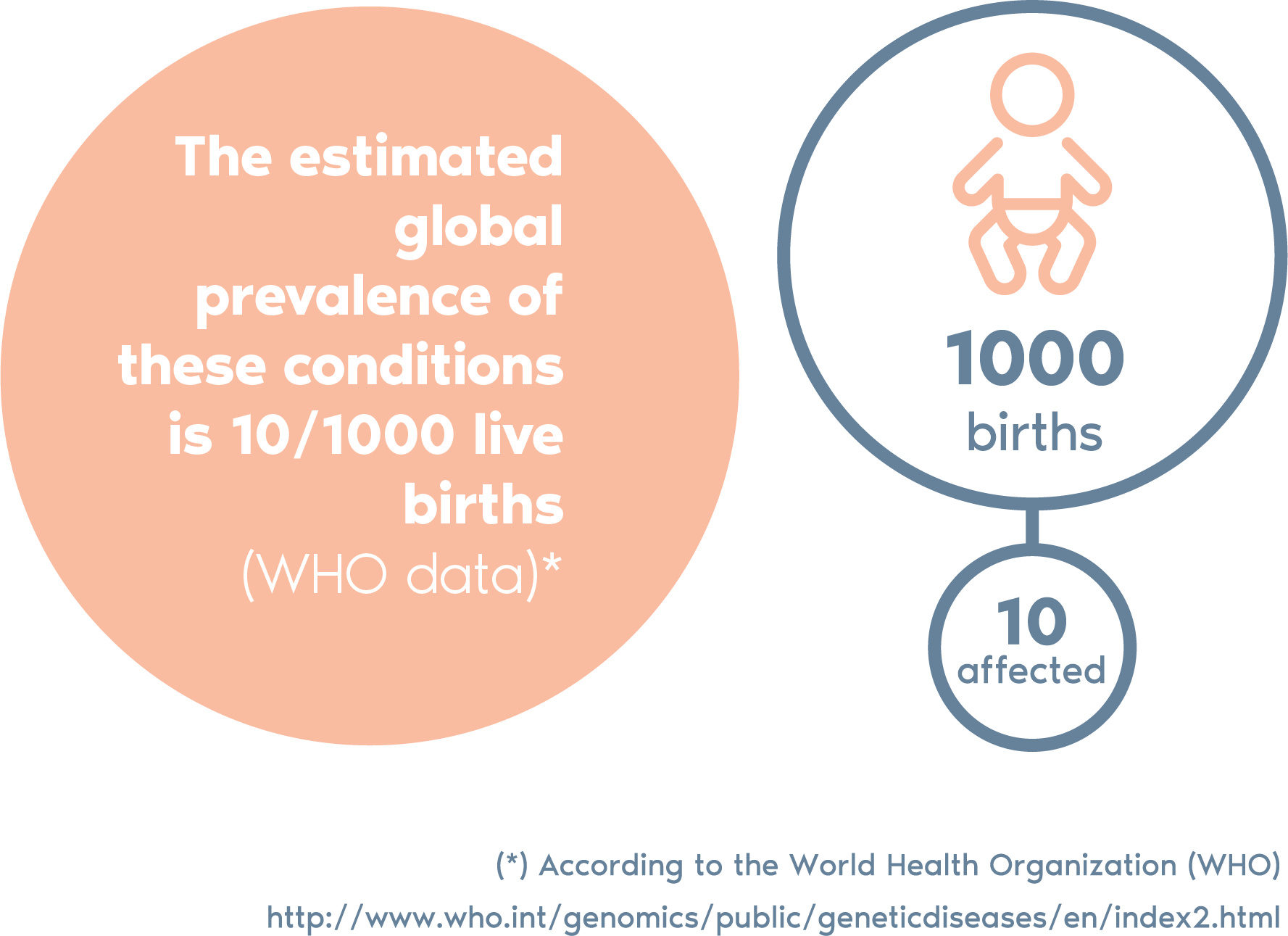CGT is an advanced genetic test that determines the chance of having a child
What does it mean to be a carrier of a genetic condition?
Genes provide the instructions for our bodies to work and grow. Harmful spelling mistakes (‘variants’) in a gene can prevent the gene from working in its usual way, and this may lead to a genetic condition.
For some genetic conditions – known as ‘recessive’ conditions – a variant can be present in a gene without having any health implications for the individual with the variant – the individual is a carrier of the condition. Most people are carriers of at least one recessive condition, often without even knowing it. Some examples of recessive conditions that you may be familiar with are cystic fibrosis (CF) and spinal muscular atrophy (SMA). While carriers do not generally show any signs of recessive conditions themselves, in some circumstances, they may have an increased chance of having an affected child.

(*) Kingsmore S. PLOS Currents Evidence on Genomic Tests. 2012 May 2. Edition 1. doi: 10.1371/4f9877ab8ffa9.
Who can have CGT?
CGT is available to anyone who wants to learn more about their risk of being a carrier of a genetic condition, including:
- Couples who are planning to conceive naturally.
- Individuals/couples who are pursuing assisted reproduction treatment.
- Sperm or egg donors.
- Intended recipients of donor sperm or donor eggs.

What is CGT?
Until relatively recently, couples and matched donor/recipient pairs would only discover that they were carriers of the same genetic condition when they had an affected child. Now, with Carrier Genetic Testing or CGT, we are able to analyse the genes of biological parents (the individuals providing the egg and sperm) to determine whether they are carriers of the same condition before they have a child.
If both biological parents are carriers of the same condition, in each pregnancy there would be a 25% or 1 in 4 chance that the child would inherit two harmful variants (one from each biological parent) and therefore be affected with the condition.
CGT can also examine whether individuals assigned female at birth are carriers of a range of recessive conditions that are ‘X-linked’; these are conditions that usually affect males, but females can be carriers. An example of an X-linked condition is Duchenne muscular dystrophy (DMD). If a carrier female has a son, there would be a 50% or 1 in 2 chance that he would be affected.
If CGT results indicate an increased risk of having a child with a genetic condition, options may include proceeding as planned with an understanding of the risk, testing embryos created through IVF, testing in pregnancy, egg or sperm donation, and adoption.
Igenomix UK offers four types of carrier genetic tests. We can help you decide which option is most appropriate.
CGT BANK
CGT Bank involves basic screening for egg and sperm donors. Seven genes associated with common autosomal recessive conditions are analysed in sperm donors and an additional 66 genes associated with X-linked conditions are included for egg donors.
CGT PLUS
CGT Plus involves the analysis of a range of genes associated with over 500 recessive genetic conditions, including X-linked recessive conditions in individuals assigned female at birth. This test is appropriate when both individuals in a reproductive couple are seeking CGT to find out if they might be carriers of the same genetic condition, or as a more extensive carrier screening option for egg or sperm donors.
CGT EXOME
CGT Exome is our most extensive CGT option and involves the analysis of a range of genes associated with over 2000 recessive genetic conditions, including X-linked recessive conditions in individuals assigned female at birth. This test is appropriate when both individuals in a reproductive couple are seeking CGT to find out if they might be carriers of the same genetic condition.
CGT SYNC
CGT SYNC is appropriate when one individual in a reproductive couple (one partner or a sperm or egg donor) is a known carrier of one or more autosomal recessive genetic conditions. It involves a bespoke, in-depth analysis of the relevant gene or genes in the other reproductive partner. The optional analysis of X-linked recessive conditions is available for individuals assigned female at birth.
















